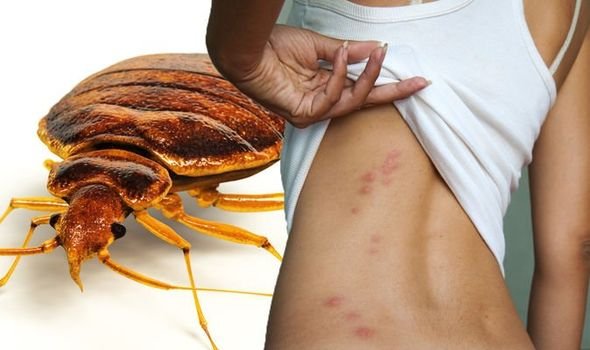Pest Control Provider Demystified: The Scientific Research Behind Eliminating Insects and Bugs
Behind the relatively routine job of removing parasites lies a remarkable globe of scientific principles and methodologies that drive the process of parasite monitoring. From understanding the complex actions patterns of pests to employing cutting-edge modern technologies for their obliteration, the realm of bug control runs on a structure of understanding that extends much beyond simply wiping out unwanted trespassers.
Parasite Behavior Evaluation
Checking out pest actions is essential in establishing effective pest control approaches for both domestic and commercial setups. By understanding the behaviors and patterns of parasites, parasite control specialists can apply targeted and effective options to remove problems.
Furthermore, researching parasite habits helps in identifying the most ideal methods of bug control. Different parasites might call for various methods, such as baiting, capturing, or chemical treatments. Knowing that a particular type of pest is mostly energetic at night can aid in scheduling therapies for optimum efficiency. Generally, a detailed evaluation of pest habits is vital for developing tailored pest monitoring strategies that are both environmentally friendly and highly effective.
Integrated Bug Monitoring Techniques
Integrated Bug Management Techniques involve thorough strategies that utilize a mix of safety nets, organic controls, and checking to efficiently take care of parasite populaces. Preventive measures intend to get rid of variables that bring in pests, such as food and water sources, by executing correct sanitation methods. This consists of sealing splits and holes, taking care of leakages, and saving food in airtight containers. Organic controls include presenting natural killers or bloodsuckers to regulate pest populations, minimizing the need for chemical pesticides. Launching ladybugs to prey on aphids in a garden is a typical biological control approach. Surveillance plays a critical duty in Integrated Insect Management by regularly inspecting and determining pest populations to identify one of the most ideal control techniques. By utilizing a mix of these strategies, bug control services can minimize the environmental effect of pest administration while efficiently lowering pest populaces in a sustainable manner.
Eco-Friendly Pest Control Solutions

With a concentrate on sustainability and ecological consciousness, environment-friendly parasite control remedies provide a natural and effective choice to conventional chemical pesticides. These methods focus on using non-toxic components derived from plants, minerals, or various other organic sources to deal with pest problems without triggering harm to the setting, humans, or non-targeted varieties.
One popular environment-friendly technique is biological insect control, which includes presenting natural predators, parasites, or microorganisms to handle parasite populaces. By utilizing the power of nature's very own checks and balances, this method can effectively control insects without the need for harmful chemicals. In addition, organic pesticides obtained from plants like neem, pyrethrum, and garlic have shown assurance in repelling or killing pests while continuing to be secure for beneficial pests and animals.
Additionally, environmentally friendly parasite control remedies usually concentrate on safety nets such as sealing pest inspection entrance points, eliminating food and water resources, and keeping proper cleanliness to discourage insects from infesting buildings. By incorporating these sustainable practices, pest control services can efficiently get rid of insects while reducing ecological effect.
Role of Technology in Bug Removal
Modern developments in technology have reinvented the area of bug elimination, enhancing the effectiveness and effectiveness of bug control services. One of the vital technical devices in insect control is the usage of remote surveillance tools, such as video cameras and sensors, which aid in determining bug hotspots and tracking bug movements.
Additionally, the growth of environment-friendly pesticides and lures that are more targeted towards specific insects has actually been implemented through technical improvements. This targeted technique minimizes the total use chemicals, minimizing ecological influence while properly managing pest populaces. In addition, making use of drones for airborne surveys and targeted chemical application in hard-to-reach areas has structured bug control operations.

Value of Routine Bug Inspections
Regular insect assessments are important for keeping a pest-free setting and avoiding problems from holding. By conducting regular evaluations, building proprietors can detect insect problems at an early stage, enabling swift and targeted interventions to remove the pests before they recreate and spread out. These inspections offer a possibility to recognize prospective entrance points where pests can penetrate the premises, allowing aggressive measures to secure off these gain access to points and stop future problems.
Additionally, regular pest assessments can assist protect the health and wellness of owners by guaranteeing that the setting stays free of disease-carrying insects and allergens. Early detection of pests like rats, roaches, or bed insects can protect against health threats linked with their existence, such as allergic reactions, contamination of food and water resources, or the transmission of illness.
In enhancement to securing human health, normal pest assessments are essential for maintaining the structural integrity of buildings - ez commercial pest control service. Specific pests, such as termites, can cause next considerable damages to wood frameworks if left unattended. Through routine assessments, residential or commercial property this website owners can identify termite invasions early and implement procedures to stop expensive architectural fixings
Final Thought
